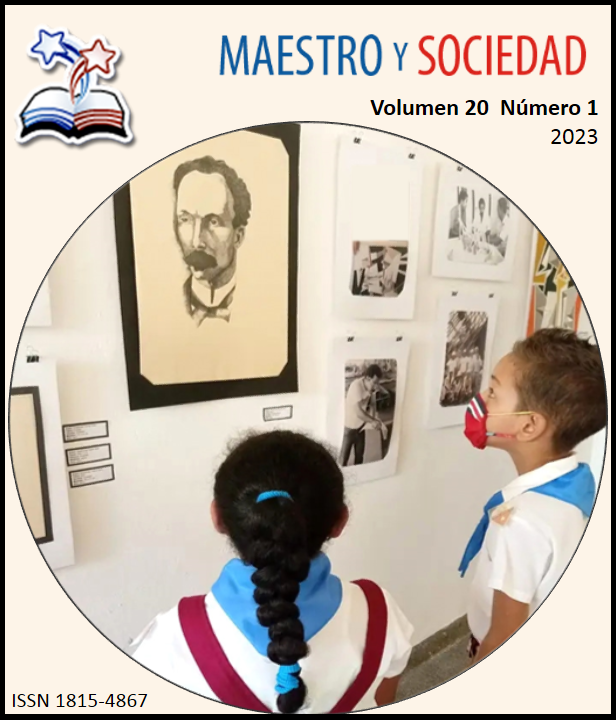Uso de técnicas psicoterapéuticas por el maestro logopeda a educandos con tartamudez
Use of psychotherapeutic techniques by the speech therapist for students with stuttering
Palavras-chave:
maestro logopeda, superación profesional, técnicas psicoterapéuticas, tartamudez, educación inicial, speech therapist teacher, Advanced professional, psychotherapeutic techniques, stammering, Initial educationResumo
Introducción: La investigación centra su atención en la preparación del maestro logopeda en el uso de técnicas psicoterapeutas a educandos con tartamudez, en el marco del primer ciclo de la educación inicial. Su objetivo es la elaboración de un sistema de pautas metodológicas que preparen a este especialista en este tema.
Materiales y métodos: Se aplican métodos teóricos, empíricos y estadístico-matemáticos, modelación de las pautas metodológicas que se proponen; así como, evaluar la pertinencia, factibilidad y eficiencia de su implementación en el primer ciclo de la educación inicial.
Resultados: Este promueve impactos científicos que enriquecerán las herramientas didáctico-metodológicas como parte del perfeccionamiento del contenido y las formas de llevar a cabo la superación del maestro logopeda.
Discusión: La educación en Cuba constituye un pilar fundamental para la sociedad y más al referirnos a la atención a los niños con necesidades educativas especiales. La educación de los mismos está dirigida a lograr un desarrollo integral, propiciando su incursión a la sociedad.
Conclusiones: Esto contribuye a elevar la preparación de éste y su incidencia favorable en el desarrollo psico-emocional de los educandos anteriormente referidos, aspecto que garantiza su inclusión social, como lo prescribe el Tercer Perfeccionamiento Educacional Cubano.
Introduction: The research focuses its attention on the preparation of the speech therapist teacher in the use of psychotherapist techniques for students with stuttering, within the framework of the first cycle of initial education. Its objective is the elaboration of a system of methodological guidelines that prepare this specialist in this subject.
Materials and methods: Theoretical, empirical and statistical-mathematical methods are applied, modeling of the methodological guidelines that are proposed; as well as, evaluate the relevance, feasibility and efficiency of its implementation in the first cycle of initial education.
Results: This promotes scientific impacts that will enrich the didactic-methodological tools as part of the improvement of the content and the ways to carry out the overcoming of the speech therapist teacher.
Discussion: Education in Cuba constitutes a fundamental pillar for society and more so when referring to the care of children with special educational needs. Their education is aimed at achieving comprehensive development, promoting their incursion into society.
Conclusions: This contributes to increase the preparation of this and its favorable incidence in the psycho-emotional development of the aforementioned students, an aspect that guarantees their social inclusion, as prescribed by the Third Cuban Educational Improvement.
Referências
lenguaje escrito. Revista Observatorio de las Ciencias Sociales en Iberoamérica, 2(9), 149-161. https://www.eumed.net/es/revistas/observatorio-de-las-ciencias-sociales-en-iberoamerica/ocsiabril21/preparacion-docentes p 149
Fernández, G. (2004). Trastornos de la fluencia verbal. Implicaciones psicopedagógicas. Ed. Pueblo y Educación.
Gaceta Oficial. (2022). Resolución 140 de 2019. Ministerio de Educación Superior. https://www.gacetaoficial.gob.cu/es/posgrados
Lemoine, E., Poumier, M. y Minerva, L. (2020). La terapia floral una alternativa para niños con trastornos del lenguaje (tartamudez). Cognosis
Lores, I. (2013). Concepción pedagógica de ayuda logopédica para escolares de la educación primaria con trastornos en el lenguaje escrito. [Tesis de doctorado, Universidad de Ciencias Pedagógicas “José de la Luz y Caballero”].
Montero, A. (2021). La superación profesional del logopeda para desarrollar la comunicación oralen escolares primarios. [Tesis de doctorado, Universidad de Granma].
Morejon, A. (2019). Manual de psicoterapia, teoría y técnicas. Herder Editorial, S.L.
Organización de Naciones Unidas para la Educación, Ciencia y Cultura. (2014). Educación para Todos (EPT) en América Latina y el Caribe: Balance y Desafíos post-2015. https://unesdoc.unesco.org/ark:/48223/pf0000230628
Sánchez, Y. (2020). Perfeccionamiento de la orientación profesional pedagógica al profesorado novel en la Universidad de Ciego de Ávila. [Evento de Pedagogía 2021].
Solari, M. y Trujillo, N. (2017). Dificultades de habla y tartamudez en niños de 5 años y 6 meses a 9 años y 0 meses asistentes a terapia de fluencia en el centro peruano de audición, lenguaje y aprendizaje. Universidad Católica del Perú.
Downloads
Publicado
Como Citar
Edição
Seção
Licença
Copyright (c) 2023 Tatiana Hierrezuelo Coroneaux

Este trabalho está licenciado sob uma licença Creative Commons Attribution-NonCommercial-NoDerivatives 4.0 International License.
Esta revista proporciona un acceso abierto inmediato a su contenido, basado en el principio de que ofrecer al público un acceso libre a las investigaciones ayuda a un mayor intercambio global de conocimiento. Cada autor es responsable del contenido de cada uno de sus artículos. Los artículos pueden ser inéditos o estar disponibles previamente en servidores de preprints reconocidos por la revista. Sin embargo, no se permite la duplicación de la publicación o traducción de un artículo ya publicado en otra revista o como capítulo de un libro.
This journal provides immediate open access to its content, based on the principle that providing the public with free access to research supports a greater global exchange of knowledge. Each author is responsible for the content of each of their articles. Articles may be previously unpublished or available on preprint servers recognized by the journal. However, duplication of publication or translation of an article already published in another journal or as a book chapter is not permitted.
Esta revista oferece acesso aberto imediato ao seu conteúdo, com base no princípio de que oferecer ao público acesso gratuito à pesquisa contribui para um maior intercâmbio global de conhecimento. Cada autor é responsável pelo conteúdo de cada um de seus artigos. Os artigos poderão ser inéditos ou estar previamente disponíveis em servidores de preprints reconhecidos pela revista. No entanto, não é permitida a duplicação de publicação ou tradução de artigo já publicado em outro periódico ou como capítulo de livro.



























 Universidad de Oriente
Universidad de Oriente 